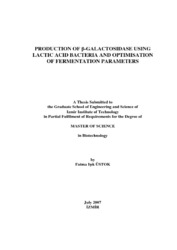Please use this identifier to cite or link to this item:
https://hdl.handle.net/11147/3859Full metadata record
| DC Field | Value | Language |
|---|---|---|
| dc.contributor.advisor | Tari, Canan | - |
| dc.contributor.author | Üstok, Fatma Işık | - |
| dc.date.accessioned | 2014-07-22T13:52:31Z | |
| dc.date.available | 2014-07-22T13:52:31Z | |
| dc.date.issued | 2007 | - |
| dc.identifier.uri | http://hdl.handle.net/11147/3859 | - |
| dc.description | Thesis (Master)--Izmir Institute of Technology, Biotechnology, Izmir, 2007 | en_US |
| dc.description | Includes bibliographical references (leaves: 90-97) | en_US |
| dc.description | Text in English; Abstract: Turkish and English | en_US |
| dc.description | xiii, 120 leaves | en_US |
| dc.description.abstract | Food grade thermostable B -galactosidase preparations are always in demand for a number of industrial applications. Thermostable -galactosidases from LAB having a neutral pH-optimum can be safely used to reduce the lactose content of milk for the lactose intolerant people. In this study, -galactosidase was produced with high productivities by novel Lactobacillus delbrueckii subsp. bulgaricus and Streptococcus thermophilus strains isolated from traditional Turkish yogurt samples in Toros mountain region. A full factorial statistical design was used separately for Lactobacillus delbrueckii subsp. bulgaricus and Streptococcus thermophilus strains in screening experiments. Among the strains, Lactobacillus delbrueckii subsp. bulgaricus 77 and Streptococcus thermophilus 95/2 were found to have high potential for B-galactosidase and lactic acid production, therefore these were used in the further optimisation studies.The efficiency of different cell disruption methods was investigated on the extraction of -galactosidase. Among these, lysozyme enzyme treatment was determined as the most effective method. Optimisation studies were carried out using response surface methodology to optimize fermentation conditions for pure strains as well as for mixed ones. Therefore, symbiotic relationship between St 95/2 and Lb 77 were investigated as well. Symbiotic relationship provided 39% and 6.1 % more -galactosidase activity and 44 % and 9.73 % more lactic acid production when compared to the optimisation results of pure strains Lb 77 and St 95/2, respectively.Overall, characterization studies showed that enzymes obtained from these strains can be considered as food grade and thermostable since they are obtained from thermophile, food originated novel LAB of local microflora. | en_US |
| dc.language.iso | en | en_US |
| dc.publisher | Izmir Institute of Technology | en_US |
| dc.publisher | Izmir Institute of Technology | en_US |
| dc.rights | info:eu-repo/semantics/openAccess | en_US |
| dc.subject.lcc | TP248.L3 U88 2007 | en |
| dc.subject.lcsh | Lactic acid bacteria | en |
| dc.subject.lcsh | Lactose intolerance | en |
| dc.subject.lcsh | Lactobacillus | en |
| dc.subject.lcsh | Beta-galactosidase | en |
| dc.subject.lcsh | Fermentation | en |
| dc.title | Production of B-Galactosidase Using Lactic Acid Bacteria and Optimisation of Fermentation Parametters | en_US |
| dc.type | Master Thesis | en_US |
| dc.institutionauthor | Üstok, Fatma Işık | - |
| dc.department | Thesis (Master)--İzmir Institute of Technology, Bioengineering | en_US |
| dc.relation.publicationcategory | Tez | en_US |
| dc.identifier.wosquality | N/A | - |
| dc.identifier.scopusquality | N/A | - |
| item.openairecristype | http://purl.org/coar/resource_type/c_18cf | - |
| item.languageiso639-1 | en | - |
| item.openairetype | Master Thesis | - |
| item.grantfulltext | open | - |
| item.fulltext | With Fulltext | - |
| item.cerifentitytype | Publications | - |
| Appears in Collections: | Master Degree / Yüksek Lisans Tezleri | |
Files in This Item:
| File | Description | Size | Format | |
|---|---|---|---|---|
| T000654.pdf | MasterThesis | 2.3 MB | Adobe PDF |  View/Open |
CORE Recommender
Page view(s)
298
checked on Mar 31, 2025
Download(s)
406
checked on Mar 31, 2025
Google ScholarTM
Check
Items in GCRIS Repository are protected by copyright, with all rights reserved, unless otherwise indicated.